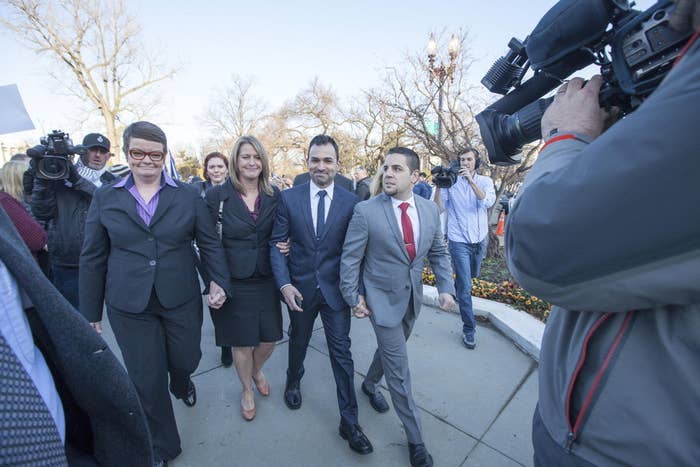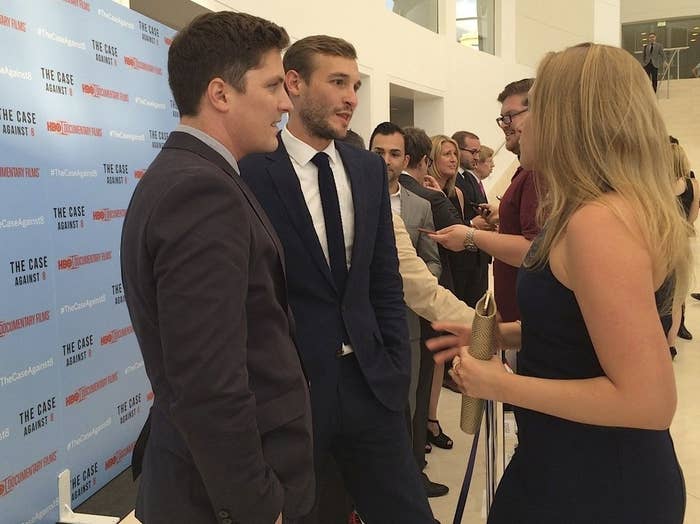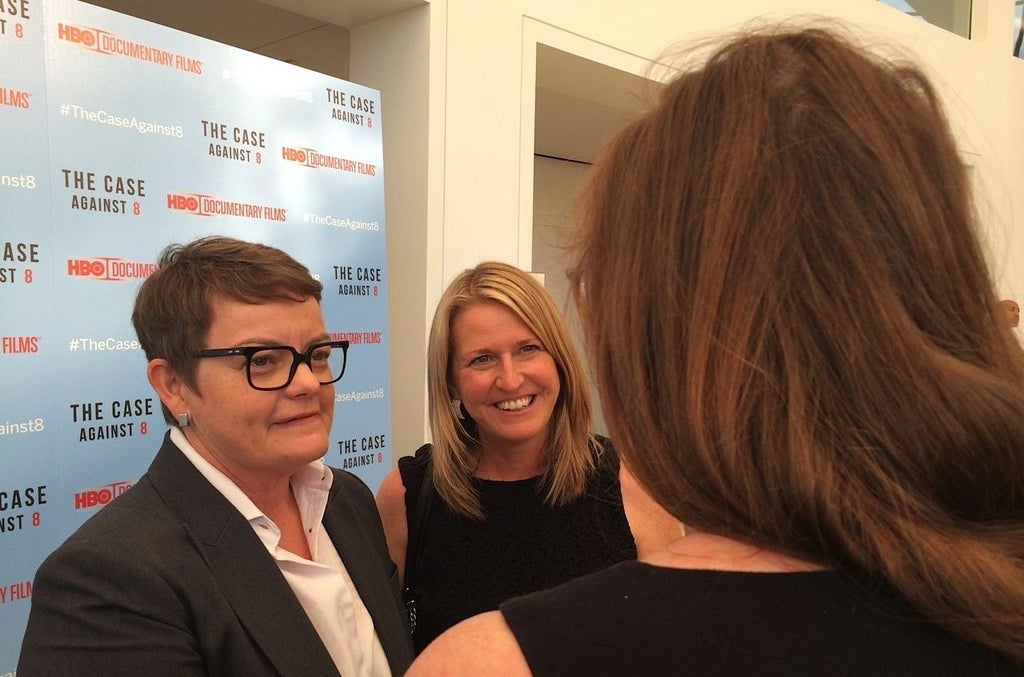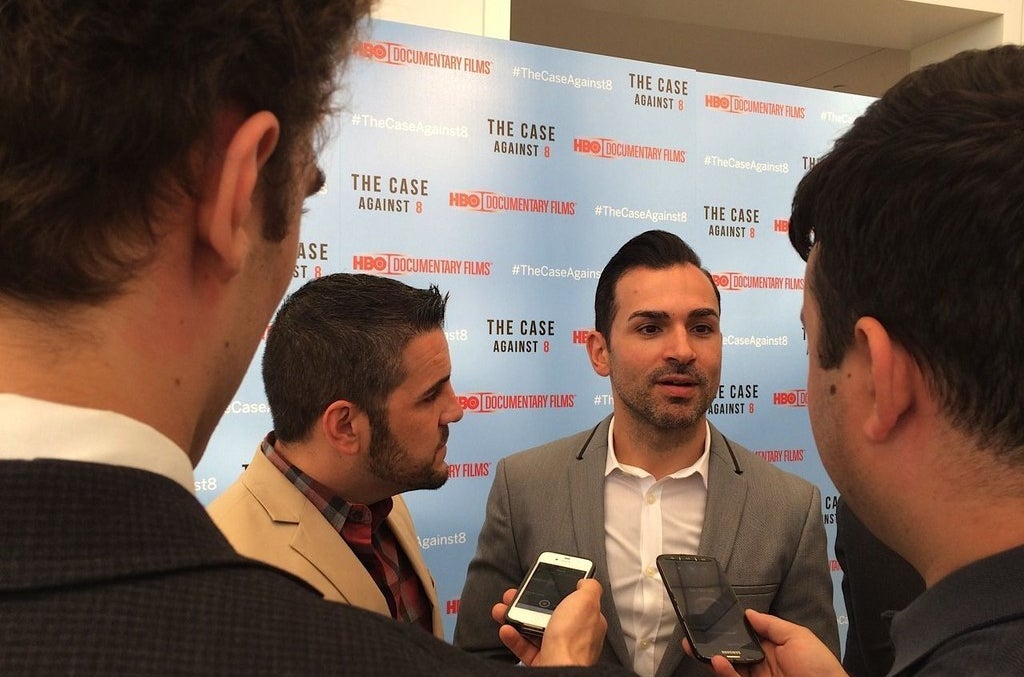
NEW YORK CITY — On Monday night, as The Case Against 8 premieres on HBO, directors Ben Cotner and Ryan White will be watching as America sees their documentary — and the stories of the two same-sex couples at the center of the case against California's Proposition 8 — brought to a nationwide audience.
For the two filmmakers, who sat down with BuzzFeed to talk about the film in HBO's New York offices the day after a screening of the documentary last month, the moment comes more than five years after they started on the project. Documenting the case against the marriage amendment, Cotner and White said two couples behind the lawsuit — Kris Perry and Sandy Stier, and Jeff Zarrillo and Paul Katami — became the key to that story as the case unfolded.
"I think, for us, since we never wanted to make a film about whether gay marriage was right or wrong, for us it was about telling the story," Cotner said of the impact that being gay Californians, like the couples, had on their filmmaking process. Cotner, who grew up in Indiana, and White, who grew up in Georgia, both described their connection to the film in emotional, personal terms — even at the end of a day of press interviews in connection with the film.
"Once we got there, and got to know Kris and Sandy and Paul and Jeff, it became obvious that this is really a story about these four people's lives and how they were affected and the harms that were done by Proposition 8 to them — and there was so much in that that we related to," Cotner said. "[B]ecause we understood the things that they were talking about, we were able to maybe hone in on some of the emotional elements."
Being so laser-focused on the case itself and the couples at the center of that case, with a supporting role from the lawyers behind the case, the documentary for the most part avoids the problems that plagued the release of Jo Becker's book, Forcing the Spring.
While Becker made broad pronouncements about how the marriage equality movement had "largely languished in obscurity" before the Prop 8 case, she spent little time contextualizing the case in the history of that movement. By also attempting to wind in the tale of Edith Windsor's case against the Defense of Marriage Act in the latter half of her book, Becker did even more damage to her attempt to tell the story of the Prop 8 case by forcing questions about Windsor's case, which, in the aftermath, has had a far greater direct impact on the court decisions that have followed.
Cotner and White, who premiered the documentary at this year's Sundance Film Festival, succeed in largely avoiding those pitfalls by singularly focusing on the Proposition 8 case plaintiff couples and their story — and not the history or politics or aftermath. And while Becker's book was hindered by its reliance on few sources in telling that broader story, Cotner and White succeed at storytelling by keeping the focus tight and their story simple. The screen time given to lawyers Ted Olson or David Boies and their colleagues is, by and large, aimed at advancing the couples' stories — not their own.
"I mean, the film is called The Case Against 8," White said, "so we were keenly aware the entire time that we were just telling one small chapter in a long history and hopefully there are many chapters to be told and films and books. We were making a character film about this team of people."
Of the controversy over Becker's book, Cotner said, "It was hard for us because, you know, we've spent five years doing this, and we have a lot of respect for Jo and the work that she did. Obviously, there are things in it that are controversial, but a lot of what we were trying to do with the film — similar to the the idea that Ted and David coming together would strip the sort of partisanship out of it — we wanted to take the politics out of the issue and focus on the plaintiffs and their journey, which is something that so many people can relate to."

"As LGBT people, I think it's just important to tell as many stories as possible," White said, "and every personal story is important. And this, to me, is Paul and Jeff and Kris and Sandy's story."
"I remember thinking during the media training, 'These women are going to kill it,'" he said of Perry and Stier. "I think Kris has a way of expressing herself that I don't have — as you can tell right now. She speaks so plainly without being dramatic or without hysterics, but delivers the heaviest messages to me."
"And she was like that from day one, and I remember thinking, Wow, if the world can see this woman, she has a way of explaining things that everyone will relate to — and especially someone who grew up as an LGBT youth. I thought, I could follow this woman for years, and luckily she allowed that."
Four years later, White was at their wedding — a long-planned but abruptly implemented happening that followed the unexpected move to allow same-sex couples to resume being able to marry in California just days after the Supreme Court dismissed the appeal of the case on technical grounds.
"We were both in Los Angeles," Cotner said of the day the 9th Circuit ended the stay of the trial court judgment in the case, which allowed the weddings to resume, "And we got a call: 'Go to the airport.'"
"'Don't ask any questions, get in an airplane,'" White said they were told.
"So, Ryan jumped on a plane and went to San Francisco, made it just in time to film —"
"— in bright blue shorts and a T-shirt," White said with a grimace. "My mom will never let me hear the end of that — I was at Kris and Sandy's wedding in a T-shirt and bright blue shorts."
"And so, the fact that I was able to get to Paul and Jeff and he was able to get to Kris and Sandy, and we got the whole thing."
"And we always say it was the hardest day of filming because we did not want to be filmmakers that day. We just wanted to be there. So, the ending that we had was the happiest ending that we could have imagined."
That the film ended with two weddings was not, of course, preordained.
"Whether it had been a win or loss," White said, "we were dedicated to just telling the story of what these people went through — and luckily it turned out the way it did."


Cotner said that the documentary had come about because he had known Chad Griffin and Kristina Schake, the political strategists who had been behind the lawsuit, "[T]hey let me know that this was happening. Ryan and I went to them with the idea of making a documentary about it, just on the outside chance — because obviously back then nobody knew that there would be a trial, nobody knew that it would go to the Supreme Court."
In from the ground floor, Cotner and White were there on those first two days of media training with the couples, first with Katami and Zarrillo in Los Angeles and then, the next day, with Perry and Stier.
"[T]hey were very green and had no idea what to expect," White said. "We were also very green. We didn't know what was going to happen."
Cotner laughed, noting, "It was my first film. I was still figuring out how to use the camera."
Saying he had a "vested interest in what happened to Proposition 8" because he is gay, White said that reality also made a difference as he filmed. "[T]hough I'm single and I'm not close to getting married, whether we won or lost, whether Prop 8 stayed in effect or didn't, I had a stake in," he said. "So, it's been really different, as a documentary filmmaker, to get to work on something that's so meaningful."
"Ditto," Cotner said. "But I am in a relationship, though not engaged."
"He's a very mean person," White said playfully.
"I actually met the man that I fell in love with halfway through this filming process," Cotner said. "So, it was some sort of like, learning about the importance of marriage while I'm falling in love with someone."
When asked when Cotner and his boyfriend met, it was White who responded: "Luckily, it was in the slow period. Otherwise, you wouldn't have even met him, probably."
"It was probably around the Ninth Circuit decision," Cotner said.
"I made another movie; Ben started a relationship. That's sort of our quiet time."
Then, in December 2012, the Supreme Court accepted the case, with oral arguments set for late March 2013.
"Once the Supreme Court granted cert, we knew we had a great third act, either way," White said, noting, "It would have been a very different film — it would have been a much bigger call to action if it had the sad ending — but we were definitely dedicated to, it was a character film to us, and we had to show what happened to these characters in the end."
Then, they did get their happy ending with the decision dismissing the appeal, and the marriages that followed in June 2013 — more than five years, and 600 hours of footage, later.
"We've seen our film thousands of times, right?" White said. "We could recite every word for you, and we do so many screenings now, and Ben and I will leave and grab a bite to eat or a drink during the film, but we always come back for the end."
The television premiere of the documentary is at 9 p.m. Monday on HBO.
